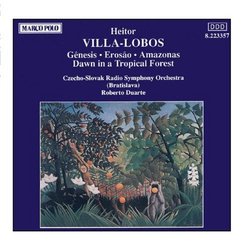Wildlife, vast spaces and lonely places in music
A. Berenschot | 09/15/2000
(5 out of 5 stars)
"Concerning his orchestral music, this is one of my very favorite Villa-Lobos cd's. If you are finished with the overrated Bachianas and discovered the supremity of the Choros, then the next step is to the ballets, symphonic poems, and symphonies. Villa-Lobos wrote a lot in each of these catogories. Genesis and Erosao are two late masterpieces, written in the fiftees. Both Genesis and especially the suprising uncommon austerity of Erosao give the listener a sense of remote, vast and humanless regions, more than any other orchestral piece by Villa-Lobos. Erosao shows influences of Bruckner in its contrast between broad brass chorales and soft playing solo instruments. The latter are at some moments accompanied by beautiful strange waving sounds in the lowest strings, a typical Villa-Lobos orchestration invention. Genesis contains more of those highly original orchestrations. Villa-Lobos really enjoys playing with sound and strange but effective combinations of instruments. In Genesis there is one nostalgic melody which permeates the piece halfway, first played by the clarinet, then by full orchestra with a suprising original contrapuntal writing, and finally in a faster tempo with Brazilian rhythms and percussion. All the four pieces on this cd contain birdsounds, but in Genesis they are the most exuberant, including a luxurious glissando of lots of instruments. You didn't hear such a thing before! At the end the music of this wonderful piece becomes more and more quiet and lonely, except for the the last few bars, when there is one large crescendo of a chord to end the piece. Amazonas (1917) belongs with Choros no. 8 and parts of Choros no. 11 to the composers most complex orchestral pieces. It is premiered only in 1929 in Paris, together with the premiere of Edgar Varese's Ameriques. Contrary to the vast spaces of Genesis and Erosao the music of Amazonas throws you in a fascinating almost claustrophobic dense web of music full of junglesounds that surrounds you in a sultry atmosphere. The waving and cradling motives of string-harmonics like sounds of insects together with clarinet birdcries somewhere in the middle of the piece give a wonderful hallucinating effect. The piece ends in an almost Ivesian soundweb of simultaneous music. After the fascinating but oppressive and sultry atmosphere of Amazonas the cd ends relieving with Dawn in a Tropical Forest which starts with a long gradually evolving introduction, consoling and beautiful rising upwards. The fast section which follows is with its fugal Bachianas influences less interesting and a little dissapointing, but the supreme beauty of the introduction makes this short piece very much worth to listen."
A highly enjoyable recording of highly enjoyable music of gr
Discophage | France | 01/16/2008
(5 out of 5 stars)
"When I reviewed the Villa Lobos Louisville reissue on First Edition Music (Villa-Lobos: Erosion; Dawn in a Tropical Forest; Danses Africaines; Bachianas Brasileiras No. 4), I pulled this one out of my shelves for comparison: both discs share "Erosion (Origin of the Amazon)" and "Dawn in a Tropical Forest". I had good memories of this Marco Polo CD. Listening to it again bears out the impression: it is a marvelous disc.
The "Amazonian" inspiration accompanied Villa Lobos throughout his compositional career. Two of his earliest works were the symphonic poem "Amazonas", featured here, and the ballet "Uirapuru", from 1917, which is the other great such pieces not presented on this CD (modern recordings include Brazil '88 - A Brazilian Music Extravaganza - Heitor Villa-Lobos: Chôros No. 8 / Fantasia for Cello & Orchestra / Uirapuru / Marlos Nobre: Convergências - Janos Starker, Cello, Heitor Villa-Lobos: Orchestral Music or Latin American Ballets). But it is significant that the composer should have returned to that inspiration in the early fifties, with Erosion (1952), Dawn (1954) - two Louisville commissions - and the ballet Genesis (1954). Villa Lobos died in 1959, so these were, in a way, his swan songs. All four are compositions of great evocative power, full of lush and exotic colors, some starting with hushed and shimmering strings over exotic Brazilian percussion evoking an awakening in the Amazonian forest, and all rising to sweeping, epic lyricism, power and grandeur. "Dawn" and "Amazonas" are relatively short pieces - 10 and 13 minutes here - but Genesis and Erosao are substantial (18:30 and almost 20).
Listening to the competing First Edition Music reissue, I found that the Louisville aged sonics from the early 1950s and music director Robert Whitney's tight-fisted approach did not give an entirely fair chance to Dawn and Erosion. I am usually not in favor of the more relaxed approach, as I find it often looses the energy and drive; but these Villa Lobos compositions require just that kind of sensuousness. With Roberto Duarte and the Marco Polo sonics you get the lush orchestral colors and a broad approach to tempos that were missing in these Louisville recordings, giving full rein to the pieces sensuousness and grandeur. What you loose, though, is a sense of drive: in the fast section of Dawn, for instance, starting at 4:58, Duarte gives the impression of a powerful but heavy-footed trudging. As it turns out, there is a cheap competing modern recording of Dawn, by David Montgomery leading the Jena Philharmonic, on Arte Nova (Villa-Lobos: Orchestral Works), which gives us the best of both worlds, I find: Whitney's drive (with a little more flexibility and lyricism) and clear sonics, with brightly spotlighted solo instruments which, in some spots, give more than Duarte the sense of the beasts shouting in the tropical forest, rather than just music instruments playing atmospheric tunes.
Still this is a highly enjoyable recording of highly enjoyable music, in a highly coherent program. 61:30 minutes of music is also a good deal.
"
Fantastic Villa-Lobos Recording From Marco Polo
J. Rich | 05/20/2010
(5 out of 5 stars)
"Before I talk a bit about this recording allow me to say that the reviewer who wrote that the Villa-Lobos' series "Bachianas Brasileiras" was overrated has a rather negative view of these works and more importantly the composer himself. These works may be popular, but they're popular for a reason: classical listeners enjoy these works and who could blame them? They showcase Villa-Lobos abilities as not only a composer, but an orchestrator. Simply put, the reviewer should re-examine these truly mesmerizing works, but I'm also glad the reviewer mentioned the "Choros." These are, indeed, excellent compositions, which were written before the "Bachianas," but are no less interesting.
Now, moving onto this recording of some lesser-known Villa-Lobos orchestral works. "Genesis" opens up the disc and it's hybrid of symphonic poem/ballet. It is the strongest work here. The piece begins with a rush of energy and then it becomes very quiet, then it builds up and explodes which introduces a central section where the horn section just bursts while the string section are playing some remarkable counterpoint. I can only imagine the amount of endurance it requires to pull off this particular section. The next work is titled "Erosao," which is a symphonic poem. It begins very quietly, but this piece takes a little bit longer to climax, but when it does it is glorious. "Amazonas" is next and should be a bit more familiar to Villa-Lobos fans and listeners. It is a decent work not one of my favorites. The last piece is "Dawn in a Tropical Forest" and it's quite impressionistic, but it changes course after the long, lush introduction.
I'm not familiar with conductor Roberto Duarte, but his intentions with this music seem genunine, passionate, and sympathetic. The Slovak Radio Symphony Orchestra play great or as good as they can. They're certainly not a Berlin Philharmonic or Royal Concertgebouw, but who is? They perform admirably well. The sound quality overall is also quite good.
To newcomers of Villa-Lobos this might not be the place to start, but those already familiar with his music and his style should find much to enjoy here. Highly recommended."


 Track Listings (4) - Disc #1
Track Listings (4) - Disc #1


